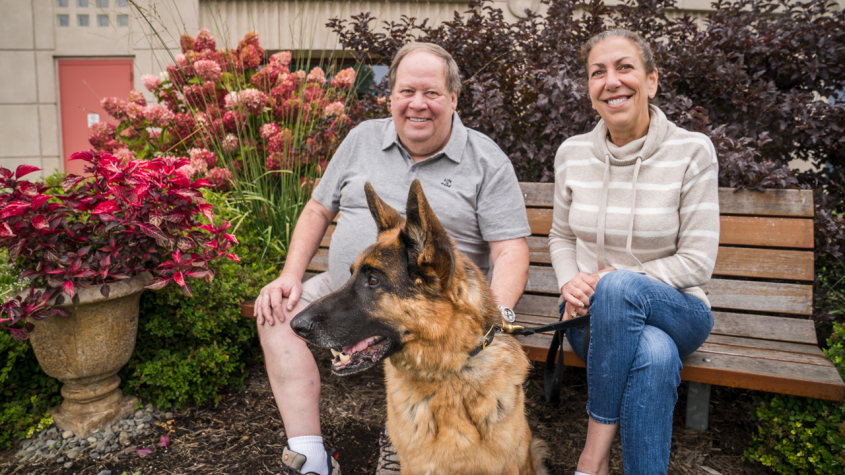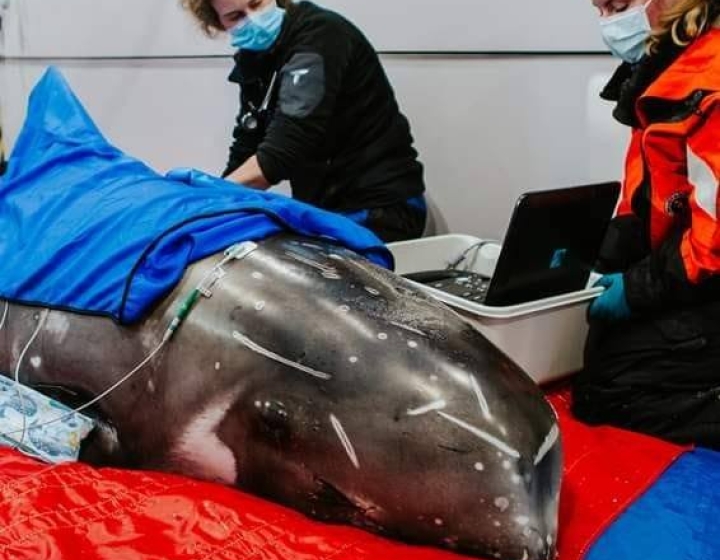The remarkable Remington: Fund helps patients with rehabilitation therapy
Few Cornell University Hospital for Animals (CUHA) patients have been through as much as Remington Augusiewicz (known as Remi). The eight-and-a-half-year-old German shepherd has been to almost every specialty section at CUHA and received several years of lifesaving care from the Sports Medicine and Rehabilitation (SMR) Service.
The intensive experience with the SMR Service left Remington’s owners, Ceanna and Randy Augusiewicz, with immense gratitude. “They [Dr. Wakshlag and Dr. Frye] literally saved his life,” says Ceanna Augusiewicz. “They did everything they could for Remi. We were so grateful, we wanted to give back somehow in helping others.”

The Augusiewiczes had brought Remi home with his brother Rex in early 2015. Unfortunately, as a puppy, Remi encountered health problems, including hip dysplasia. The Augusiewiczes drove from their home in West Islip, Long Island, to see Joseph Wakshlag, D.V.M. ’98, professor of clinical nutrition and sports medicine and rehabilitation, who agreed to see Remi on short notice. Upon seeing Remi’s condition, he and Chris Frye, D.V.M. ’11, associate professor of sports medicine and rehabilitation, initiated critical care immediately.
Remi stayed at CUHA and would end up spending the majority of his first two years of life at the hospital. “Remi was there more than he was at home,” says Ceanna Augusiewicz. The pup weathered 15 surgeries within two years, receiving rehabilitation after each one, consisting of physical therapy sessions five days a week, two-to-three times a day.
The intensive physical therapy resulted in some impressive successes; when Remington first arrived at CUHA, he had no use of his rear legs. But after the Augusiewiczes support and the expertise of Wakshlag and Frye, Remi was able to use the limbs again.
“It was really wonderful to see that puppy make such an impressive recovery,” says Frye. “His case is a great example of how sports medicine and rehabilitation can make a huge difference in a patient’s life. Remington is family to us. We have been through a lot; we all love him deeply and we will always be there for him.”
The Remington Fund
To show their appreciation for how CUHA has helped Remi, the Augusiewiczes created the Remington Fund. Now active for roughly seven years, the fund has helped over 80 families who could not otherwise afford rehabilitation services at CUHA. One fund recipient, R. Mark Brown, wrote in thanks to the Augusiewiczes for the assistance in caring for his collie Max. “I simply can’t thank you enough, it was a huge blessing,” he says. “The care at Cornell was absolutely the best. Thanks to their top quality, state-of-the-art care, Max and I continue and look forward to quality days ahead.”
Another recipient, Mary Monopoli, was able to give her golden retriever Marshall shockwave and underwater treadmill therapy for his hip and elbow dysplasia and arthritis. “[This] scholarship has allowed me to provide Marshall with therapy that will prolong his quality of life,” says Monopoli. “The water therapy Marshall receives at Cornell is strengthening that left leg enough to allow a reduction in his pain and has given him greater mobility.”
The Augusiewiczes want to ensure pets like Max and Marshall will always get the help they need by making the Remington Fund permanent, aiming for a goal of raising $100,000 over the next few years. “We would love to see it continue to grow in assisting more families and saving our beloved dogs,” says Augusiewicz. “Remington will forever be a reminder of what strength, love, dedication and teamwork can achieve. With generosity and donations, we can achieve this goal together!”
Visit this page to donate to the Remington Fund.
Written by Lauren Cahoon Roberts





